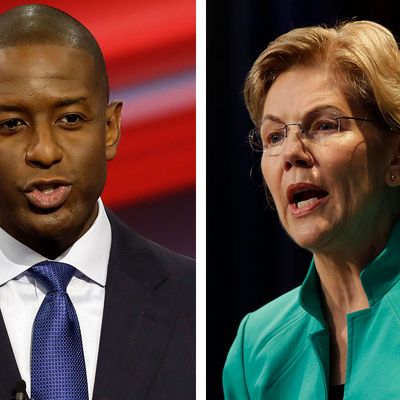
If you want another indication that Elizabeth Warren has arrived as a co-front-runner for the Democratic presidential nomination, here you go (from The Daily Beast):
Sen. Elizabeth Warren (D-MA) … has been in contact with [former Florida gubernatorial nominee Andrew] Gillum over the past several months, multiple knowledgeable sources told The Daily Beast …
[T]wo sources said the talks between Warren and Gillum resemble the kind of courtship that happens when a leading presidential candidate is exploring potential vice-presidential contenders. One source briefed on the communications said the two Democrats have been in contact over the course of the campaign and that it is the “strong impression” that Gillum is a possible vice-presidential contender for Warren, who has risen in recent months to become a front-runner in the 2020 primary, the source said.
Warren’s campaign is denying that anything veepish is going on here and contends that she’s just consulting Gillum (for whom she cut an ad last year) as part of learning the lay of the land in the Sunshine State. Florida is holding what could become a key primary role (its contest is on March 17, two weeks after Super Tuesday) and is, of course, a major general-election battleground state. Among other things, Gillum is heading up a major voter-registration drive there.
Who knows what’s really going on? Even if she were eyeing Gillum as a running mate, Warren wouldn’t want to admit it at this point, since it would show a certain Harvardian hubris to be thinking much about whose hand to clasp in Milwaukee at the national convention before the first vote is cast to choose a nominee.
But it does raise a question: When is an appropriate time to begin thinking about a veep?
Everyone would agree not to follow the old-school tradition, in place until pretty recently, of figuring it all out at the convention itself. That approach was generally abandoned after 1972, when George McGovern struggled to find a willing running mate and then hastily chose Senator Tom Eagleton, whose previously undisclosed history of treatments for mental illness led to his resignation from the ticket under pressure just 18 days after his selection. The need for careful vetting was reinforced in 2008 when John McCain impulsively and in great secrecy picked little-known Alaska governor Sarah Palin, who subsequently proved to have some pretty alarming gaps in her knowledge base and threatened to upstage her senior partner on the campaign trail.
At the other end of the spectrum, there’s always the possibility that a candidate could not only choose but announce a running mate before winning the nomination, making the “ticket” a part of the campaign. It’s happened only twice: in 1976 when, shortly before the convention, Ronald Reagan announced Senator Richard Schweiker of Pennsylvania as his running mate in the unsuccessful hope of moving enough delegates from Gerald Ford to upset the incumbent; and in 2016 when another Republican, Ted Cruz, joined hands with former rival Carly Fiorina in April, soon after Trump had mathematically locked up the nomination.
Let’s just say the jury is out on the wisdom of this move, though it could work in certain circumstances. It has been mentioned in this cycle most often with respect to Joe Biden, who has reportedly considered naming a young pol early on to assuage concerns about his age.
The question of timing is heavily influenced by the criteria a candidate has for choosing a running mate. If, for example, a presidential aspirant is auditioning as a “unity candidate” in a divided party, aligning with someone from another part of the party might make sense, either as a primary-season tactic or a post-primary graceful gesture. In 2016, for example, it might in retrospect have saved Hillary Clinton a whole world of trouble had she chosen, well before the convention, a running mate (perhaps Sherrod Brown of Ohio, perhaps even Warren) who was pleasing to Bernie Sanders supporters.
A variation on the unity rationale for a relatively early veep choice is the need to address a particularly significant weakness displayed by the principal candidate. Let’s say, for the sake of argument, that midway through the primaries Warren is locked in a tight battle with Biden, who is still showing his current disproportionate strength among African-American voters. A “surprise” ticket with an African-American could make some tactical sense, particularly if she’s already comfortable with the prospective running mate and has done a full vet.
That brings us back to Gillum. He’s young (just 40), male, progressive without being abrasive about it, and, as noted above, from a crucial state. True, his highest office so far has been mayor of Tallahassee, but that’s a city with a population nearly twice as large as Pete Buttigieg’s South Bend.
Truth is we have no idea whether Gillum has become the apple of Warren’s eye or is just a good pol for her to know. Inaccurate veep speculation is a chronic disease of the chattering classes, emanating from campaign factions, would-be running mates, bored reporters, and even devious opponents. A wide consultation is indeed a good idea as long as the candidate doesn’t accidentally offend a prospect by raising expectations too high. In the end, running mates don’t usually matter that much in general elections, and the Democratic veep candidate isn’t likely to cut much ice in the kind of polarized cage match 2020 is certain to be. But as Biden shows, serving as vice-president can become a pretty good credential for a future run for the top job, so it will always be one of the greatest rewards a candidate can confer — and, as the cliché goes, the first key decision made by the next president of the United States. If the vetting process begins early and is serious, it could even encompass sooner rather than later a meaningful look at whether this or that option would make a good president.






























